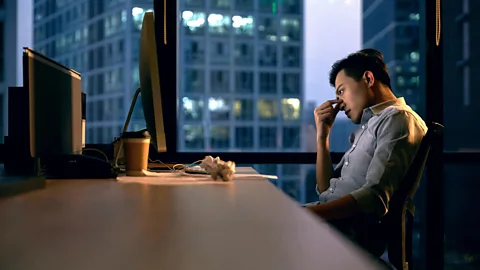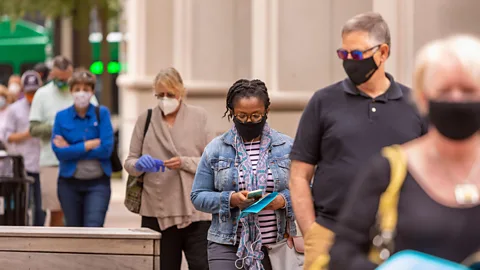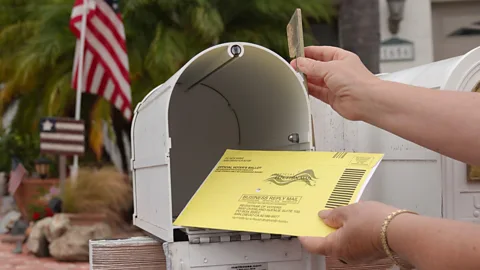How to work on a huge news day

 Alamy
AlamyMillions will be watching the election – but they also have to work. What's the best way to stay on task when days are filled with headlines and breaking news?
Today, Americans go to the polls to elect their president. It’s been a combative campaign, and voters on both sides of the political divide will be anxiously awaiting the result.
Hundreds of millions will be watching events unfold, and it's not necessarily clear when we may have the result. Polls don’t close in Alaska until 0600 GMT on 4 November, though as more Americans than ever have voted early, it could take longer for states to tabulate votes, especially in the hotly contested battleground states whose results could swing the election.
Most people, meanwhile, will have to work. Tasks need to be performed, e-mails sent, clients appeased, bosses placated – even if all you want to do is scour breaking news updates for each new nugget of information.
Whether it's a national election, or a day filled with Covid-related press conferences, getting work done amid non-stop breaking news alerts can be a tall order. So, here’s our guide to staying on track and squeezing a reasonable amount of productivity on workdays filled with news flashes, social media updates and push notifications.

Anticipation is key
First, the best thing you can do is acknowledge that you may not get much done. If you're in the US, "workplaces, schools and other institutions should expect it’s not going to be efficient on election day,” says Craig Sawchuk, a doctor who specialises in anxiety treatment at the Mayo Clinic, one of largest medical research centres in the US. “It’s a once-every-four-years thing.” That means giving yourself more leeway or, if you’re a manager, being more understanding of the reality of the situation.
Elissa Epel, professor of psychiatry at the University of California, San Francisco, says that while some people might be able to absorb themselves in work in these situations, others will need to inject a little realism into their task planning for what they know will be a busy news day. “I suggest you do not have deadlines, that you trim your to-do lists to be more reasonable, because no doubt you will be very distracted and inefficient. Period. That is to be expected.”
Anticipating that you might be distracted on a busy news day – and creating contingencies around that – will make the day less stressful. If you feel like you need to cancel some meetings, then do so. And if you’re worried the tension might get on top of you, plan activities that might calm you down – like a quick chat with a friend or a short break in the park. “Having a ‘cope ahead’ plan for how you’re going to deal with emotional overwhelm, if it hits, is helpful because in the moment, it’s hard to manage,” she says. “We can’t plan on our emotional reaction, but we can plan for how we will act if we need to.”
Manage your media, control your tasks
Knuckling down to anything when your mind is elsewhere is hard.
“There is no quick fix. Managing distraction requires mastering emotions,” says Nir Eyal, a Singapore-based writer and author of Indistractable, a book about controlling your attention. “The number one source of distraction is not the news, it's our inability to handle emotional discomfort.”

He suggests people who need to work try to be aware of internal triggers – feelings or urges, like anxiety – and external triggers – like pings from devices – that make them want to check the news. Log when you’re experiencing internal triggers to better identify them, then link them to distracting behaviours. As for external triggers, mute notifications on your phone or avoid colleagues who want to dissect the election. Eyal also uses apps that block your access to sites that might distract you. “You can say: ‘Hey, look, I’m not going to have any access to these four websites, because I know that’s what could potentially lead me astray’.”
Chris Bailey, an Ontario-based writer and author of Hyperfocus, a book about productivity at work, says that we should “use the news as a reward for getting work done”. Once you’ve knocked off a task, “treat yourself to an all-you-can-eat buffet of news and distraction”. This works the same way as an “e-mail sprint”; the idea that you plow through as many emails as you can in a fixed window of time as a way of reducing the constant distraction of your inbox. “News sprints” can serve the same purpose, he says; set a timer for 10 minutes, “but when that time is done, disconnect from it until the next one comes along – maybe after you complete an important project”.
Bailey also says that, surprisingly, big news days could be a good time to start a new project. That’s because our brain has a built-in “novelty bias” that gives us a shot of the pleasure-inducing neurotransmitter dopamine. On a day like Election Day, we could channel that craving for election updates into beginning a fresh task. “The novel tasks in our work can be helpful to focus on if you’re looking to transition from checking the news to getting some work done,” he says. “They can help you settle into a flow, and act as a sort of bridge to more important work.”
If that’s not working for you, however, Julie Morgenstern, a productivity writer and author of Never Check Email in the Morning, suggests doing the organisational tasks we always feel too busy for, such as “cleaning out and reorganising your digital or paper files, catching up on digital filing, shredding old piles of papers and printouts, setting up reach-out systems to stay in touch with clients”.
Knowing the election schedule and when key developments are expected, like significant exit polls or indicative results in important swing states, could also help keep you productive. Whether you’re in the US or elsewhere, knowing when useful information is likely to emerge and where you’ll go to get it gives you chunks of time to ignore the news and tick off work tasks. “Just decide and be intentional. The key is to avoid constantly, mindlessly checking,” says Morgenstern.

Find your release valve
If the result is delayed and the headlines keep rolling for several days, Sawchuck recommends what he calls functional disconnecting; limiting your media consumption to reduce mental stress. Early on in the Covid-19 pandemic, he recommended reducing media exposure to once or twice per day for 15 to 30 minutes each time; just enough to stay informed but not enough to totally derail you from your day.
You may also need to rely on functional disconnecting’s twin coping mechanism: functional connecting. “Make sure that you stay in contact with family, friends, co-workers – healthy people in your life,” says Sawchuck; embrace positivity over a period that will combine news and work stress. Build recharging mechanisms in your day, like a jog or a TV zone-out session to help you navigate your regular workload. “Build in these pressure-release valves,” adds Sawchuk.
Work-wise, if the election drags on you’ll need to prioritise, says Morgenstern, as you pick meetings back up that you had rescheduled earlier. “After a few days, it should be easier to weave some of those higher-stakes people in,” she says.
David Barker, professor of government at American University in Washington DC and an expert on US elections, says that we should plan for political drama lasting far beyond 3 November. “Regardless of the outcome, there’s going to be a huge chunk of the country, 40% at the minimum, that’s going to be extremely angry and feel like the election was stolen from them,” he says. That may call for identifying what Epel describes as “psychological first aid strategies”. She says: “A question to ask yourself is, ‘if [the election result] is bad news to me, what will help me the most?’”
And there’s one key thing to focus on: when it comes to the election, there is a deadline that must be met no matter what. “Everything needs to be done and wrapped up by January, when the inauguration occurs,” Barker says. If only we can stay focused at work until then.
